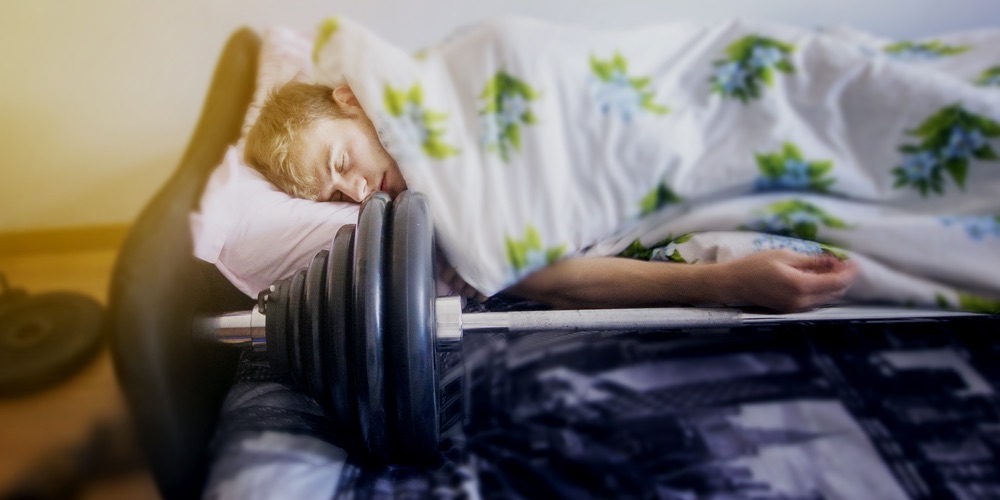Why sleep matters
Training, diet and recovery are 3 key factors that will impact on performance. Recovery can be divided into 2 main categories:
- Exercise-related recovery – includes the acute and short-term rest that occurs between reps and sets.
- Longer term recovery – refers to the period of recovery between exercise units and between exercise days.
Here, however, we consider “recovery” in terms of sleep. And, over a series of articles over the coming weeks, I’ll be discussing the following:
- How too little or too much is associated with ill-health.
- How sleep is an anabolic state.
- How athletes in fact don’t get sufficient sleep for optimal recovery.
- How lack of sleep is a big injury risk and illness factor.
The latter is a fact that is poorly appreciated in sport and exercise science.
In addition, in a later blog post, we will look at how we can best encourage sleep in our athletes as well as other fascinating sleep periodisation studies and how they help you perform better and recover better.
Sleep: Non-negotiable but poorly prescribed
Sleep is a non-negotiable requirement for life. Any animal will eventually die if not permitted to sleep. Rats will die after 2 to 3 weeks of total sleep deprivation or after 5 weeks of partial sleep deprivation (Rechtschaffen & Bergmann, 1995). For obvious reasons, this type of experimentation is not possible with humans. It is also very rare that a person would become sleep deprived to the point of death because severely sleep-deprived humans will begin to have 30-second intervals of “microsleep” – brief periods in which the brain does not perceive environmental stimuli and brain waves briefly adopt sleep patterns (Science News, 2011).
For everyone, if sleep is not of sufficient duration or quality then it affects our normal day-to-day functioning. Surprisingly, given our understanding of the importance of sleep, it is often ignored when the coach or scientist or clinician plans and prepares a programme that is detailed in training methodology, order, technical, tactical and psychological as well as dietary preparation.
How lack of sleep affects general health
Poor sleep patterns are linked to poor health. For example, Cohen and colleagues (2009) found that participants with fewer than 7 hours of sleep were 2.94 times more likely to develop a cold when infected with a cold virus compared with those who had 8 hours or more of sleep. Patel et al (2012) also examined the incidence of pneumonia in middle-aged women and reported that compared to 8-hour sleepers, women sleeping less than 5 hours per night or greater than 9 hours per night had a significantly higher relative risk of contracting pneumonia.
What’s clear is that both too little and too much sleep contribute to ill-health.
Sleep – an anabolic state
When we sleep, we move into an anabolic state – in which energy conservation, repair and growth take over. Having a regular sleep pattern and a sufficient amount of sleep time is essential in ensuring that this anabolic state occurs.
During sleep, levels of adrenaline and corticosteroids drop and the body starts to produce human growth hormone (Van Cauter et al 2000). Growth hormone (GH) secretion is stimulated during sleep and, in men, 60% to 70% of daily GH secretion occurs during early sleep, in association with slow wave sleep (Van Cauter et al 1998). GH promotes the growth, maintenance and repair of muscles and bones by facilitating the use of amino acids in the processes.
Every tissue in the body is renewed faster during sleep than at any time when awake. Melatonin is another hormone produced to help us sleep. Secreted by the pineal gland deep in the brain, it helps control body rhythms and sleep-wake cycles. Levels of melatonin rise as the body temperature falls, to encourage feelings of sleepiness. The opposite occurs to wake us up.
It is mostly during sleep that the sex hormone testosterone and the fertility hormones, follicle-stimulating hormone and luteinising hormone, are secreted. A cancer killer called TNF – tumour necrosis factor – also pumps through our veins when we are asleep. Research has shown that people who stayed up until 3am had one-third fewer cells containing TNF the next day, and that the effectiveness of those remaining was greatly reduced.
What’s next?
In our next blog post in this series, we will look at whether we get more or less sleep now than decades ago and also how much sleep our teenagers are getting. What if they are not getting enough quality sleep? Also we consider how being a morning or evening type can impact on training adaptation.


Leave A Comment